Some startups begin with a spreadsheet and a very serious investor meeting. Buzzinga.io began with a family vacation and one man’s very real desire to turn his relatives into Jeopardy contestants, complete with buzzers, custom categories, and enough inside jokes to qualify as a HR concern. Steven Dennett, a front-end developer with a graphic design past and the kind of enthusiasm for trivia that borders on competitive sport, wanted to host a game that felt more like a proper show and less like a PowerPoint. When the internet failed to provide a tool that wasn’t clunky, outdated, or trying to upsell him on educational worksheets, he did what any curious and mildly frustrated developer would do, he built his own. That little side project now generates over $7,000 per month and serves everyone from teachers to corporate event planners to people who just really, really like to buzz.
The Accidental Game Show Tycoon
Steven built Buzzinga.io into a platform that lets users create and host fully customizable trivia games, complete with buzzers (physical or mobile), real-time scorekeeping, and a host interface that actually makes the host’s life easier. Whether it’s a classroom review session or a rowdy family reunion, Buzzinga turns chaos into fun, and with enough polish that teachers are using it in schools and friends are using it to humiliate each other over who knows the capital of Kazakhstan.
While most people return from vacation with a few blurry beach photos and maybe a tan, Steven came back with a validated MVP. After putting together a test version for his trivia-loving cousins, a game filled with personal anecdotes and jokes only his family would understand, he realized he had built something more than a one off side project. Friends and relatives started asking if they could use it for their own events, classrooms, and team-building sessions. That was the moment he realized Buzzinga could be more than a novelty, it could be a business and with over a decade of experience in frontend development, Steven was able to polish the platform into something visually appealing and functionally reliable, a product that worked smoothly across devices and made the trivia experience both simple and dynamic.
I have mostly relied on Reddit posts, comments, and then SEO to attract customers. I’ve written some blog posts like “Best Bachelorette Party Game Idea for 2025…”, but I’ve spent most of my time making sure the homepage is performant and ideal for
Steven Dennett
Launch Day
Reddit is a polarising subject amongst our readership, some tell stories of being instantly banned or battling moderators, others credit it for giving them the startup launch they needed. Steven falls into the latter, having started by posting in Reddit communities, not just once, but many times, across different subreddits like r/webdev, r/SideProject, r/trivia, and various teacher forums. He focused on not being spammy but rather engaged with questions, offered help, and only shared his product when it genuinely fit the discussion.
The response was immediate and positive and by December 2023, he launched a free version of the platform. He didn’t start charging until January 2024, when he sent out a simple email to his growing user base explaining that a Pro version was launching, and within a day, six people had upgraded. That was the turning point, Buzzinga wasn’t just a clever tool anymore, it was a product people were willing to pay for. He began with a one time $25 lifetime access offer, but eventually shifted toward a more sustainable subscription model, the kind that quietly grows in the background while you sleep.

Growing & Scaling
Steven’s approach to marketing was refreshingly old-school in all the best ways: be helpful, be present, and keep showing up. Reddit remained a consistent source of traffic and SEO began to kick in once his blog posts, including surprising hits like “Best Bachelorette Party Game Idea”, started to rank. A successful launch on Hacker News in July 2024 helped even more, earning Buzzinga a full day on the homepage and a burst of new users. Then Digg.com picked it up, proving once and for all that if you’re useful, entertaining, or even just a little different, the internet will still reward you. With each post, each comment, and each unexpected backlink, the platform grew, steadily, organically, and without a single dollar spent on advertising.
Lessons Learned
Looking back, Steven admits his biggest mistake was waiting too long to monetize. By offering Buzzinga for free for over a year, he unintentionally set expectations for users that it would always stay that way, like a public service with trivia. Charging earlier would have helped him understand user behavior faster and given him the resources to expand more efficiently, he also fell into the common founder trap of aiming for perfection before launch which if you’re a regular reader you will know is a very common subject in the lessons or advice section of our founder stories. But eventually he learned what every startup founder must, the most valuable feedback comes when the product is out in the world, being used, not when it’s sitting quietly in Figma looking pretty.
Why It Works
Buzzinga’s success isn’t due to flashy marketing or cutting-edge technology, it works because it solves a real, relatable problem: people needed an easy, fun way to run live trivia games. It’s intuitive enough for teachers, flexible enough for events, and polished enough to work across any device. The buzzer system actually functions (which is more than can be said for a lot of modern hardware), and Steven’s near-legendary responsiveness, answering most support queries within ten minutes, creates a level of trust and user satisfaction that’s hard to replicate. And at the core of it all is something simple, people have fun using it, and when people have fun, they come back.
The toolkit behind Buzzinga is as focused and practical as the platform itself, Reddit and Hacker News served as launch and growth channels. SEO brought in a steady flow of organic traffic and email helped convert curious users into paying customers, and Steven’s unwavering commitment to fast, thoughtful support helped turn one time users into long term advocates. There’s no secret sauce here, just smart execution, attention to detail, and a willingness to engage with users directly.
I learned from the launch that it’s better to launch early when you’re proud of what you have versus waiting until you have every feature or until the product is perfect because you’ll never get there. If I were to do it again, I’d launch even earlier to get the initial feedback right away that would inform the roadmap moving forward.
Steven Dennett
Advice For Founders
For aspiring entrepreneurs, Steven’s advice is clear. Build something you’d actually use. If it doesn’t solve your own problem, it probably won’t solve anyone else’s. Ship early. Don’t wait for perfect, just make sure it works, use free distribution channels like Reddit and SEO and respond to people, every email, every comment, treat them like they’re the most important user you have. And finally, don’t be afraid to charge, you might be surprised how quickly people will pay for something if it makes their life easier or more fun.






